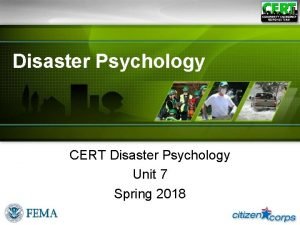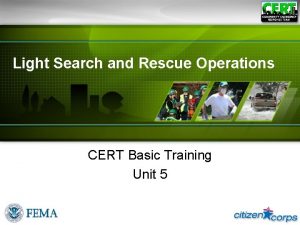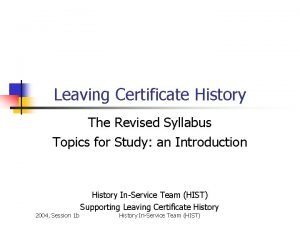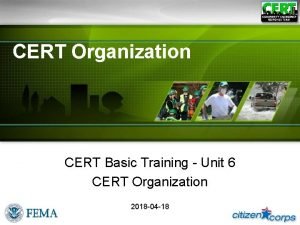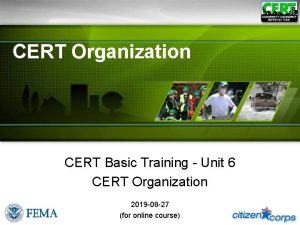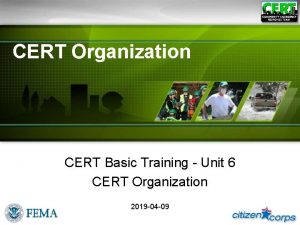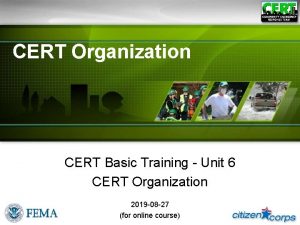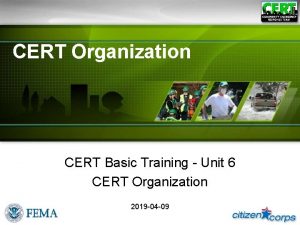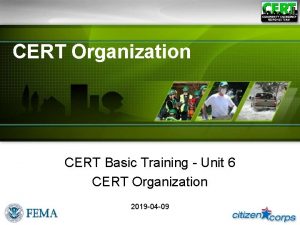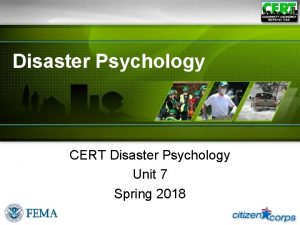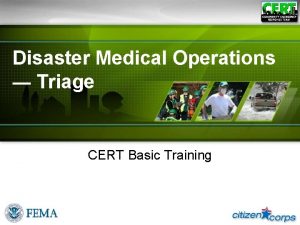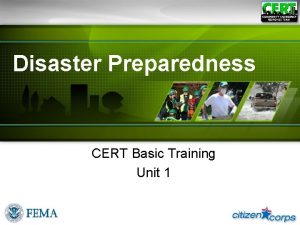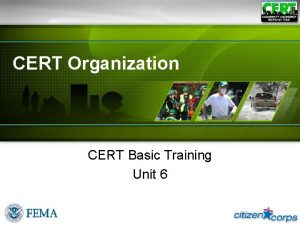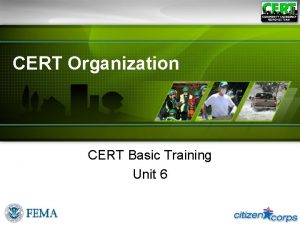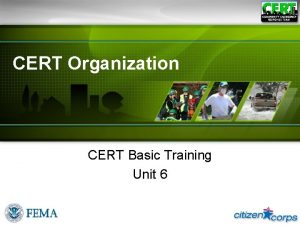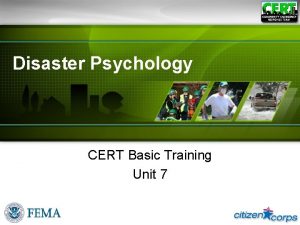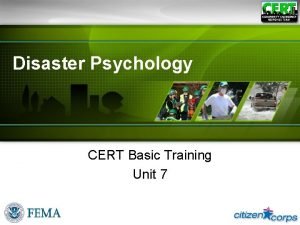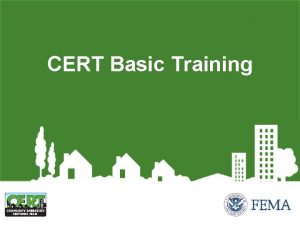Disaster Psychology CERT Disaster Psychology Unit 7 Fall




















- Slides: 20

Disaster Psychology CERT Disaster Psychology Unit 7 Fall 2019 For online course

● Slide deck is a subset of FEMA CERT slides ● Slides are for in-class companion to the online CERT basic training course provided by the University of Utah ● The complete FEMA CERT slide deck is available here - https: //www. fema. gov/medialibrary/assets/documents/27669 Unit 7 CERT Disaster Psych for online course 7 -1

Learn to Prepare Mentally for Disaster Response • Actions can be taken before, during, and after an incident to help manage emotional impact of disaster response work • Knowing possible psychological and physiological symptoms of disaster trauma helps manage impact • Learn to manage stress § CERT members for themselves § CERT leaders during response Unit 7 CERT Disaster Psych for online course 7 -2

WHAT IS DISASTER TRAUMA? Rescuers and Volunteers have potentially higher risk for psychological trauma due to w Your own personal losses w Working in your home neighborhood w Assisting neighbors, friends, co-workers who have also been injured w Not feeling safe and secure Unit 7 CERT Disaster Psych for online course 7 -3

WHAT IS DISASTER TRAUMA? Possible Psychological Symptoms: w Irritability, anger w Self-blame, blaming w w w others Isolation, withdrawal Fear of recurrence Feeling stunned, numb, or overwhelmed Feeling helpless Mood swings w Sadness, depression, w w w grief Denial Concentration, memory problems Relationship conflicts / marital discord Unit 7 CERT Disaster Psych for online course 7 -4

TEAM WELL-BEING Possible Physiological Symptoms w w w Loss of appetite Headaches, chest pain Diarrhea, stomach pain, nausea Hyperactivity Increase in alcohol or drug consumption Chronic Insomnia: Inability to sleep, Nightmares w Fatigue, low energy Unit 7 CERT Disaster Psych for online course 7 -5

TEAM WELL-BEING. . Self-Care w Be aware that disaster worker trauma/stress can follow disaster work w Explain to family member and friends how they can support you ØListen to you when you need to talk ØUnderstand that you may not want to talk w Ask for and accept help from others w Seek professional Mental Health support as needed Unit 7 CERT Disaster Psych for online course 7 -6

TEAM WELL-BEING. . Reducing Stress w Drink plenty of water w Get enough sleep w Exercise w Eat a balanced diet w Balance work, play, and rest w Accept that you cannot save everyone w Do not over-identify with survivors and do not take their feelings as your own. Unit 7 CERT Disaster Psych for online course 7 -7

TEAM WELL-BEING How Team Leaders Reduce Stress ● ● ● ● Brief CERT personnel beforehand Remember CERT is a team Rest and regroup Take breaks away Eat properly, stay hydrated Arrange for debriefing a few days after incident Rotate teams and duties Phase out workers gradually Unit 7 CERT Disaster Psych for online course 7 -8

TEAM WELL-BEING Critical Incident Stress Debriefing (CISD) phases: 1. Introductions and description 2. Review of factual material 3. Sharing of initial thoughts and feelings 4. Sharing of emotional reactions to incident 5. Instruction about normal stress reactions 6. Review of symptoms 7. Closing and further needs assessment Unit 7 CERT Disaster Psych for online course 7 -9

WORKING WITH DISASTER SURVIVORS’ TRAUMA ● Stabilizing Victims ● Assess Survivors for injury or shock ● Get uninjured people to help ● Provide support by: § Listening § Empathizing ● Help survivors connect with natural support system Unit 7 CERT Disaster Psych for online course 7 -10

WORKING WITH DISASTER SURVIVORS’ TRAUMA How to Be an Empathetic Listener ● Put yourself in the speaker’s shoes ● Listen for meaning, not just words ● Pay attention to body language - nonverbal communication ● Reflect (paraphrase) the speaker in their own words to show that you heard him/her. Unit 7 CERT Disaster Psych for online course 7 -11

How to Be an Empathetic Listener ● Allow silence – silence gives survivor time to reflect and become aware of feelings. Silence can prompt the survivor to elaborate. ● Attend nonverbally – eye contact, head nodding, caring facial expressions, and occasional “uh-huhs”. ● Paraphrase – when you repeat portions of what the survivor has said, understanding, interest, and empathy are conveyed. ● Reflect feelings – the survivor’s tone of voice or nonverbal gestures may suggest anger, sadness, or fear. Possible responses are “You sound angry, scared, etc. Does that fit for you? ” This helps survivor identify and articulate their emotions. ● Allow expressions of emotion – expressing intense emotions through tears or angry venting is an important part of healing; it often helps survivor work through feelings so they can better engage in constructive problem-solving. Slide courtesy of CART = Contra Costa County Animal Response Team Unit 7 CERT Disaster Psych for online course 7 -12

WORKING WITH DISASTER SURVIVORS’ TRAUMA What You Can Say. . . ● “These are expected reactions to a disaster. ” ● “It is understandable you could feel this way. ” ● “You can’t change what happened but you can change what you do with this experience. ” ● “Things may never be the same, but you may find some things from this experience that can help you help others. ” ● Apologize if survivor reacts negatively to something that you say Unit 7 CERT Disaster Psych for online course 7 -13

WORKING WITH DISASTER SURVIVORS’ TRAUMA Avoid Saying. . . ● “I understand. ” ● “Don’t feel bad. ” ● “You are strong” or “You’ll get through this. ” ● “Don’t cry. ” ● “It’s God’s will. ” ● “It could be worse” or “At least you still have. . . ● What you really must do… (Discounts person, not understood, more alone) Unit 7 CERT Disaster Psych for online course 7 -14

WORKING WITH DISASTER SURVIVORS’ TRAUMA Managing the Death Scene w Cover the body; treat it with respect w Move the body to temporary morgue (if death occurs at Command Post) w Follow local laws and protocols w Talk with local authorities Unit 7 CERT Disaster Psych for online course 7 -15

WORKING WITH DISASTER SURVIVORS’ TRAUMA Informing Family of a Death ● Separate the family members/friends from others in a quiet, private place ● Have the person(s) sit down, if possible ● Make eye contact and use a calm, kind voice ● Use the following words to tell the family members about the death: § “I’m sorry, but your family member has died. I am so sorry. ” ● Have one family member look at the body and decide if the rest of the family should see the body ● Allow family members to hold or spend time with the deceased ● Let the family grieve privately if possible Unit 7 CERT Disaster Psych for online course 7 -16

UNIT SUMMARY • Rescues may be unpleasant or uncomfortable • Psychological and physiological symptoms of trauma • Take steps to reduce stress • CISD is one intervention • Stress affects cognition, health, and interactions • Stabilize individuals • Be an empathetic listener Unit 7 CERT Disaster Psych for online course 7 -17

DISASTER PSYCHOLOGY UNIT # 7 RESOURCES ● CERT Participant Manual - Unit # 7 https: //www. fema. gov/medialibrary/assets/documents/27403 ● CERT Instructor Guide - Unit # 7 https: //www. fema. gov/medialibrary/assets/documents/27368 ● Unit # 7 Video http: //1. usa. gov/1 pra 6 d. E ● Unit # 7 Video transcript – link on video page ● NERT Psychological First Aid handouts § NERT Binder Addendum - PFA § NERT Psychological First Aid (PFA) Worksheets Unit 7 CERT Disaster Psych for online course 7 -18

HOMEWORK ● Fill out the NERT Psychological First Aid handout. Think about how you will feel and respond to a disaster, to CERT coworkers, and to victims. Unit 7 CERT Disaster Psych for online course 7 -19
 Cert
Cert Unit 10, unit 10 review tests, unit 10 general test
Unit 10, unit 10 review tests, unit 10 general test Natural disaster unit 9
Natural disaster unit 9 Olysalý čert
Olysalý čert Yeats leaving cert poems
Yeats leaving cert poems Question b leaving cert english
Question b leaving cert english Accounting process
Accounting process Smart cert
Smart cert Sing cert
Sing cert Sketch map of paris basin leaving cert geography
Sketch map of paris basin leaving cert geography Cert search markings
Cert search markings History syllabus leaving cert
History syllabus leaving cert Construction studies experiments
Construction studies experiments Nitrogen cycle diagram leaving cert
Nitrogen cycle diagram leaving cert Formation of sedimentary rocks leaving cert
Formation of sedimentary rocks leaving cert Lcpe
Lcpe Music technology leaving cert
Music technology leaving cert Cert 3 in pathology collection
Cert 3 in pathology collection Hhtp //cert.korcham.net/search
Hhtp //cert.korcham.net/search Bishop poems leaving cert
Bishop poems leaving cert Bishop sample essay
Bishop sample essay
